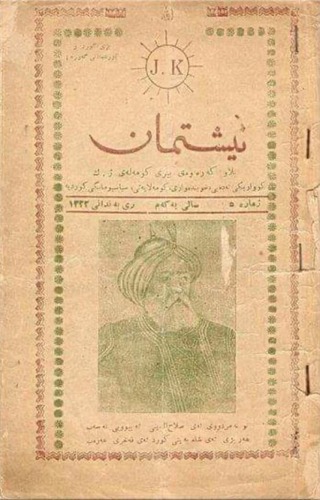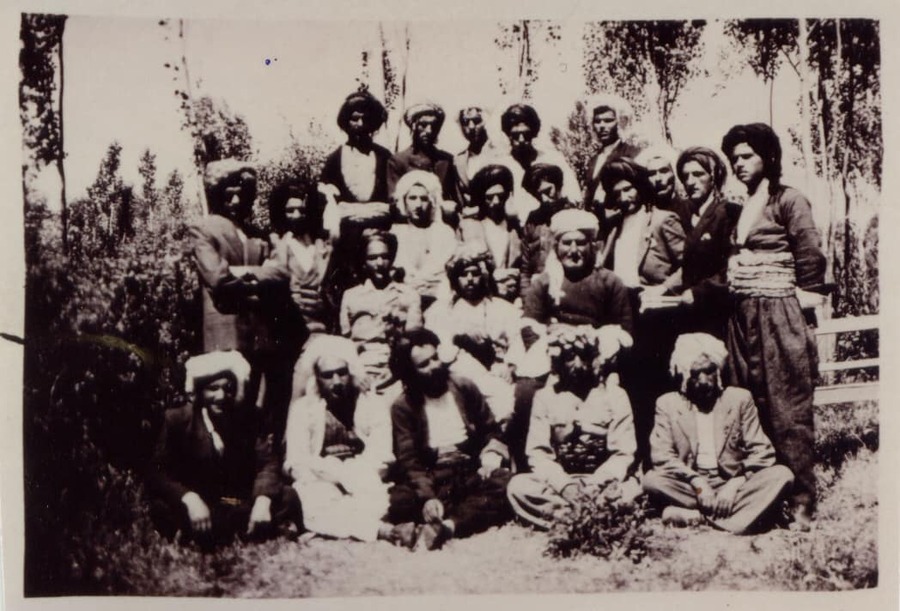Enlightenment in the West
By reviewing the history of the developed nations of the world, especially the part known as the Western world, all sociological, political, and philosophical studies identify a turning point in Western history that began four centuries ago. That is, it is considered a new beginning since the beginning of the Renaissance or the "rebirth" of Europe which is a new beginning. Four centuries ago, Western society lived in what is historically called the "Dark Ages" because of the political structure that dominated Europe. That political structure was a mixture of religious and monarchical government that opposed any new scientific, intellectual, and philosophical ideas. All directions of society had to be aligned towards a center that faced the church or the palace. That is, what is later called in Christianity the balance between the power of the church and the power of the palace is the same as that of the philosophers of the Enlightenment mentioned. Both groups, having absolute power at the level of society, strongly opposed any new ideas and innovations in philosophy, art, literature, and even social customs.
Four centuries ago, led by European philosophers, sociologists, and revolutionary thinkers, attempts were made to break some of the dominant space that occupied the whole of Europe, but first of all, it was necessary to change the social atmosphere or social world affected the individuals and take it to a better and fresher direction. Therefore, before opposing the two powers of religion and state, the philosophers tried to promote a process known as the process of enlightenment. The Enlightenment was a movement that began in education, philosophy, art, and literature and changed the level of Europeans' understanding of all aspects.
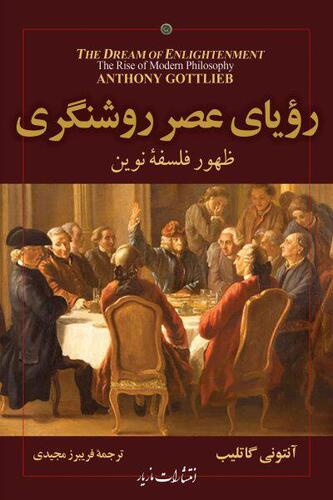
In this process, society was first of all enlightened about the absoluteness of power, thought, and religion. That means the leading Western philosophers and thinkers, known as the philosophers of the Enlightenment, first, opposed the imposed norms and traditions that misled society and showed it another way, which made people passionate about the afterlife world. In other words, in this new thought, life is defined against two options. One option is the life of the "afterlife" or the life towards the Hereafter, which the absolute authority of Christianity promoted and advocated, and the other option is the life of "this world," which defends all that is human happiness and interests that provide humanism. Throughout Western history, and to the present day, all major changes at all levels of Europe have been the result of the activity of European intellectuals since the Middle Ages at the beginning of the Enlightenment. The same pattern has been repeated in many countries.
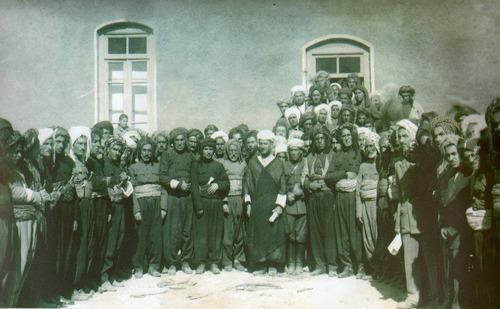
Establishment of Jekaf (JK) and the beginning of enlightenment in the East part of Kurdistan
In Kurdistan, especially in the East part of Kurdistan, in 1943 and several years before that, a form of political and social thought evolved and formed, which is considered to be the beginning of the Kurdish Enlightenment.
The establishment of the Jekaf Society in the East part of Kurdistan was a paradigm shift in Kurdish thought and a reversal of common social norms and traditions based on previous tribes and social traditions. However, the Jekaf Society, led by a group of Kurdish intellectuals and scholars of the time, proposed a new way of thinking and activating society and establishing social organizations, which prevented the traditional divisions based on tribes, clans, and all negative structures that divided and separated the society. Obviously, the achievements of the JK have been much talked about in political history. However, in the cultural history of Eastern society, there has been less mention of cultural actions and achievements, or in other words, the process of enlightenment or the process of changing thought in the JK Society. If we want to explain the beginning of the enlightenment process of the JK Society, we can better discuss this fact by identifying one of the issues of Nishtman magazine, which is the intellectual language of the JK Society.
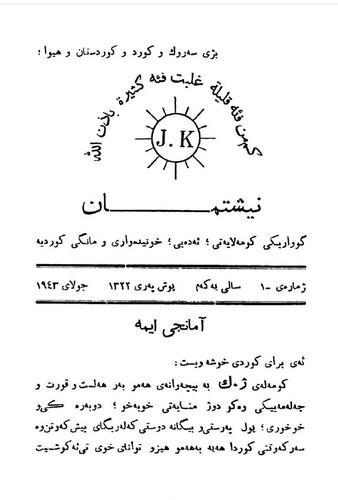
The first issue of Nishtman magazine was published in July 1943. The foreword clearly describes the paradigm shift that needs to take place in the Kurdish society. The authors of the article say that they are proposing a new direction of thinking for themselves and Kurdish society. Therefore, the article is designed in the form of a mass appeal. The foreword of the first issue of Nishtman magazine has not pointed to any tribe or group, but the people of Kurdistan. The article states:
“Confronting all the obstacles such as self-hostility, division, selfishness, money-loving, and xenophobia that exist in the path of Kurdish progress and victory, JK will struggle with all its strength to remove the chains of captivity and subjugation from the Kurdish nation. In this fragmented Kurdistan, it wants to make a great Kurdistan where every Kurd can live freely. Many people think that the Kurdish nation must be liberated from captivity by armed forces, but they are all wrong and lost the right path. Today's guns that the Kurds have now are nothing compared to what the oppositions have. Kurds must know that guns are nothing more than firecrackers compared to cannons, tanks, and aircraft. The only path the Kurds must take towards freedom is the street of civilization. This path leads straight to the center of freedom and liberation."
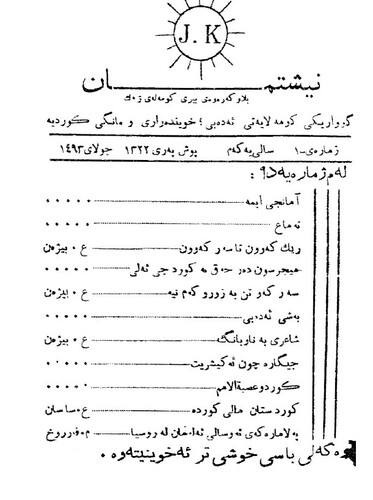
The importance of the foreword in Nishtman magazine is this; a newly established Kurdish force, the first organized force and the first Kurdish political organization that a group of intellectuals, writers, and options of society have formulated and worked for, unlike all previous movements, are taking a new path to society. They properly introduce their "Others" to the people of their nation. Even today, after the JK Society and the Kurdistan Republic, one of the basic problems of the Kurdish people is not knowing their “Others”. In other words, all Kurdish forces in all parts of Kurdistan have several capabilities, opportunities, and understandings. They also have the feeling and project to strive for the liberation of their people, but they have not properly known their “Others” so that they can acquire all the necessary mechanisms that today's world requires and act accordingly.
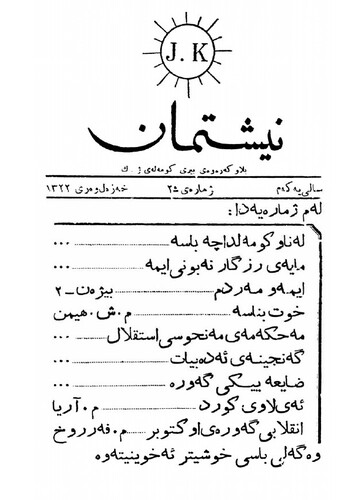
The members of Nishtman magazine, the language of JK Society, have correctly understood that the resistance against the occupying forces armed by the world powers may not take us alone in the field of arms, but the Kurds must take another path besides this. That path will lead us to the ultimate goal. The ultimate goal advocated by the JK is human “freedom” and “liberation”. That is, the same slogans that began in Europe after the Enlightenment and were one of the most prominent phenomena of the Great French Revolution, because the Great French Revolution, which was logically the product of secularism and humanism, is one of the most important slogans of human freedom. The decision makers of the JK, most of whose names were later revealed, were Kurdish intellectuals who recognized this need eighty years ago and advocated and acted for it.
The same members who later became the foundation of part of Kurdish culture and literature in the twentieth century. Some of these intellectuals include Hazhar, Hemn, Rahman Mohtadi, Manaf Karimi, Mullah Qader Modarresi, Dilshad Rasouli, Mohammad Shapasandi, Abdulqader Dabaghi, Khalamin Barzanji, Abdurrahman Zabihi, the leader Qazi Mohammad and many others.
In the next part, we will analyze the content of one of the issues of Nishtman magazine according to this discussion.
